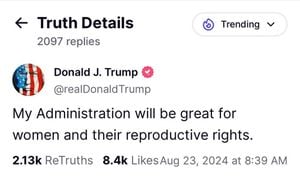Japan's reaction to the United States' new Presidency under Donald Trump is marked by both caution and strategic optimism, as Tokyo gears up to navigate the intricacies of U.S. foreign policy under the banner of "America First." Trump's inauguration on January 20 has sparked heightened anxieties within the Japanese government, reflecting concerns over how the new administration's policies might affect Japanese interests directly.
Attending the inauguration was Japan's Foreign Minister, Taro Kono, who represented Japan at the historic event attended by foreign dignitaries. This marked the first time a Japanese foreign minister has attended the inauguration of a U.S. president, indicative of Japan's commitment to maintaining strong ties with the United States amid the uncertainties of the Trump era.
Upon leaving the inauguration, Kono expressed optimism about the future of U.S.-Japan relations, stating, "We are ready to work closely with the new administration to strengthen the U.S.-Japan alliance and contribute to the peace and stability of the Asia-Pacific region." His words underscored Japan's proactive stance as it prepares to engage with Trump's administration.
Trump's inaugural address reverberated with themes of economic nationalism and stringent policies aimed at boosting American interests. With statements such as, "From this day forward, it's going to be only America first, America first," Trump set the tone for the kind of approach nations like Japan might expect. This marks a return to economic nationalism, which could potentially lead to protectionist measures—something the Japanese government is wary of.
The specter of increased tariffs looms large over Japan, as officials fear Trump’s strategy could result in pressures for Japan to make concessions. According to senior officials from Japan’s Ministry of Foreign Affairs, there are significant concerns about the demands the Trump administration may place on Japan and other ally nations. One senior official stated, "We fear it could be tough for us if Trump's protectionist policies come to fruition."
Following the inauguration, Japanese officials scrambled to gather insights on the Trump administration's intentions, even up to the last moments before the ceremonies unfolded. There were attempts to ascertain the exact nature of policy announcements, especially those related to trade and military commitments.
While specifics from Trump's speech at the inauguration did not unfairly mention Japan, it gave tacticians within the Japanese government some breathing room. They hope to strategize their next moves without immediate pressure, at least for the time being. Nonetheless, Japan recognizes the need to adapt quickly to the new realities posed by the U.S. administration.
Looking forward, Kono emphasized the importance of upcoming dialogues, such as the proposed foreign ministers' meetings with the U.S., Australia, and India. This reflects Japan's strategy to strengthen regional partnerships as it braces for any shifts from Washington. "The meeting is aimed at eleving the U.S.-Japan alliance to new heights," he remarked.
Japan's strategy moving forward involves more than just managing the threats posed by Trump’s policies; it includes leveraging existing alliances and fostering new ones through diplomacy. The prime minister of Japan, Yoshihide Suga, has reiterated Japan’s commitment to the defense and prosperity of the Indo-Pacific region. He stressed the importance of working with like-minded countries to counterbalance potential unilateral actions by the Trump administration.
Past experiences have shown Japan thrive under pressure, often adapting its strategies successfully to align with the U.S. Therefore, as Japan looks on at its erstwhile ally pivoting toward nationalistic sentiment, it is likely to emerge more resilient. With conscious efforts to fortify bilateral ties rather than drifting apart, Japan aims to convey its significance and relevance to the U.S. agenda.
The path forward may not be free of challenges, especially as Trump’s foreign policy outlook continues to evolve. Nonetheless, Japan’s response to the inauguration reflects its commitment to diplomacy and alliance-building, highlighting the importance of collaboration over conflict. Observers will be paying close attention to how the relationship develops as both nations navigate this new terrain.
Overall, Japan's governmental responses encapsulate both caution and determination, representing not only the challenges posed by Trump's America but also opportunities to reaffirm the importance of the U.S.-Japan alliance. Maintaining strong relations with the U.S. is pivotal for Japan, particularly as it looks to secure its standing and interests on the global stage, amid shifting powers and uncertain geopolitics.



